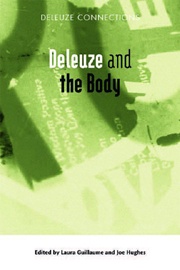Book contents
- Frontmatter
- Contents
- Introduction: Pity the Meat?: Deleuze and the Body
- DELEUZISM
- PRACTICAL DELEUZISM
- 6 The ‘Virtual’ Body and the Strange Persistence of the Flesh: Deleuze, Cyberspace and the Posthuman
- 7 ‘Be(come) Yourself only Better’: Self-transformation and the Materialisation of Images
- 8 An Ethico-Aesthetics of Heroin Chic: Art, Cliché and Capitalism
- 9 Multi-Dimensional Modifications
- 10 Dance and the Passing Moment: Deleuze's Nietzsche
- Notes on Contributors
- Index
7 - ‘Be(come) Yourself only Better’: Self-transformation and the Materialisation of Images
from PRACTICAL DELEUZISM
Published online by Cambridge University Press: 12 September 2012
- Frontmatter
- Contents
- Introduction: Pity the Meat?: Deleuze and the Body
- DELEUZISM
- PRACTICAL DELEUZISM
- 6 The ‘Virtual’ Body and the Strange Persistence of the Flesh: Deleuze, Cyberspace and the Posthuman
- 7 ‘Be(come) Yourself only Better’: Self-transformation and the Materialisation of Images
- 8 An Ethico-Aesthetics of Heroin Chic: Art, Cliché and Capitalism
- 9 Multi-Dimensional Modifications
- 10 Dance and the Passing Moment: Deleuze's Nietzsche
- Notes on Contributors
- Index
Summary
Be yourself only better.
(Premier Fitness)[The] in-itself of the image is matter.
(Deleuze 2005a: 61)The problem of the relationship between bodies and images, as it has tended to be posed in academic disciplines including, but not restricted to, media and cultural studies, concerns the problem of representation. That is, one of the dominant ways of conceiving the relationship between bodies and images is to understand the image as representing the body, with various degrees of success. As such, images are seen as capable of being decoded and deciphered, often for their ideological message and the kinds of norms they reproduce. This chapter suggests that this conception of the relations between bodies and images works within, and reproduces, a representationalist model which, in terms of the Deleuzian perspective developed here, is problematic. Drawing on Deleuze's work which attends to the affectivity and materiality of the image, I examine the way in which the relations between bodies and images can be understood as a mode of spectatorship which produces a particular set of impulses or inclinations. Taking as my focus the ways in which the prevalent cultural theme of self-transformation is organised through images, I suggest that images produce possibilities of embodiment, and become materialised in particular ways.
The chapter is an attempt to think through work on images and representation (Olkowski 1998; Marks 2000; see also O'Sullivan 2006) that has been deliberately developed in terms of ‘alternative’, non-representational or ‘creative’ works of art, and to consider whether and how such ideas might also be relevant to popular culture and, more especially, relevant to the theme of self-transformation which has often been cri- tiqued for its reproduction of capitalist values.
- Type
- Chapter
- Information
- Deleuze and the Body , pp. 144 - 164Publisher: Edinburgh University PressPrint publication year: 2011



